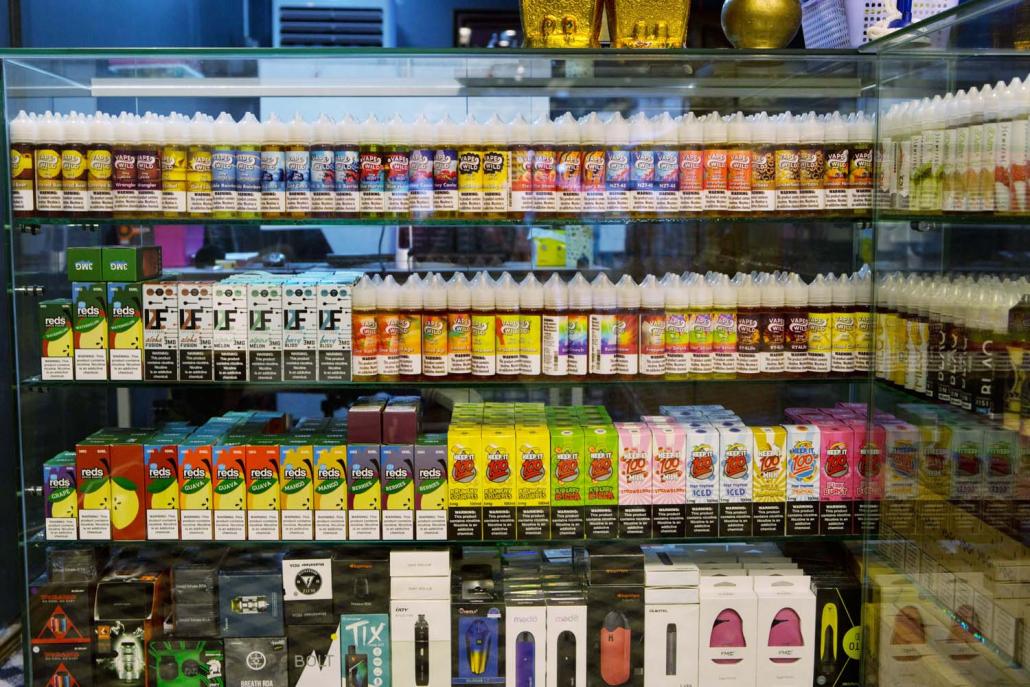The law is vague on the status of vaping in Myanmar, and the Ministry of Health and Sports may ban e-cigarettes before changes can be made to the relevant legislation.
By YE MON and EAINT THET SU | FRONTIER
THE camera pans along a row of single-use Flow e-cigarettes, each in a different coloured box to denote a certain flavor, before cutting to a wider shot of actress Thin Zar Wint Kyaw, who spends the next minute puffing suggestively and blowing smoke towards the camera. The caption under the Facebook video reads “Let’s flow with me”, together with a link to the Flow Myanmar page.
In another Facebook video, actress and singer Waso Moe Oo unboxes products from Flow and another Chinese e-cigarette brand, Relx, before explaining the prices and different flavours.
Celebrity-backed promotions like this have helped e-cigarettes – electronic nicotine delivery systems that are also known as vapes – to gain a small but loyal following in Myanmar, particularly among young, middle-class consumers. Vape shops have appeared in Yangon and Mandalay, offering single-use as well as reusable e-cigarettes and replacement cartridges ranging in price from K15,000 to as much as K1 million.
But the growing prevalence of e-cigarettes has also caught the attention of the Ministry of Health and Sports. On October 3, 2019, the ministry warned on its website about the negative health effects of e-cigarettes and recommended that the public abstain from using them.
Support independent journalism in Myanmar. Sign up to be a Frontier member.
For now, the sale and use of e-cigarettes remains legal because the 2006 Control of Smoking and Consumption of Tobacco Product Law does not mention them.
But Dr Aung Tun, an adviser at the Ministry of Health and Sports, told Frontier that the ministry was preparing to amend the law to ban the sale and use of e-cigarettes.
Because it will take “a long time” to enact the changes to the law, the ministry “is considering taking pre-emptive action and issuing orders to ban the import and sale of e-cigarettes”, he added.
It is planning to focus on the role played by importers, Aung Tun said, because the e-cigarettes are either smuggled into Myanmar, or brought in by declaring them as medical devices.
Either way, he said, they are being imported illegally.
“People usually import these products by describing them as medication that can help someone to quit smoking, but that is not a valid way to bring them into the country,” Aung Tun said. “Things are going astray because of the lack of law enforcement.”
Aung Tun said this was only possible through “corruption”, but lack of clarity over government policy on e-cigarettes appears partly to blame.
The National Tobacco Control Committee led by the Minister of Health and Sports will meet later this month to take up the issue, he said. “The meeting will talk about the processes and routes for importing e-cigarettes and will come up with action plans.”
An official from the Consumer Protection Team, which inspects some products that are imported through Yangon port, such as food and health items, said it allowed e-cigarettes to be brought into the country because they had not been explicitly banned by the Ministry of Commerce.

E-cigarettes on display at a store in Yangon. Also known as vapes, they have largely gone under the radar in Myanmar, although the first vape shop opened in 2014. (Thuya Zaw | Frontier)
A global phenomenon
Myanmar is far from the only country grappling with how to regulate e-cigarettes. With their massive vapour clouds and fruity flavours, e-cigarettes have become a popular alternative to cigarettes around the world in recent years, especially among young people. Despite health concerns, the e-cigarette market is growing rapidly in countries that have not banned the devices, including Myanmar, where celebrities promote vaping products on social media.
A debate continues about whether the use of e-cigarettes is a safer option than smoking. Companies that sell e-cigarettes and some public health experts say they can help people to quit smoking tobacco, but this claim is disputed by the World Health Organization.
It says there is not enough evidence to show that e-cigarettes help smokers to quit, but there is clear evidence that they are dangerous. “There is no doubt that they are harmful to health and not safe,” the WHO said on January 21, when it warned that e-cigarettes can damage fetuses and the brains of teenagers. “Nicotine is highly addictive and young people’s brains develop up to their mid-twenties,” WHO said, adding that “exposure to nicotine can have long-lasting, damaging effects”.
Many countries have banned the use and sale of e-cigarettes because of concern about their hazardous effects on users and those around them. The use of the devices in China and the United States is subject to strict regulations; on November 1, China tightened bans on selling e-cigarettes to those aged under 18, as well as online sales and advertisements for vaping products.
Neighboring Thailand and India banned the use of e-cigarettes in 2014 and 2019, respectively. India warned of an “epidemic” of e-cigarette use among young people when it imposed the ban last September. The United Kingdom, however, has taken a different approach, one focused on harm minimisation. While e-cigarettes are tightly regulated, they have also been embraced as a means of encouraging smokers to quit normal cigarettes.

Dr Thurein Hlaing Win from online healthcare and medical information service Hello Sayarwon. (Thuya Zaw | Frontier)
Under the radar
In Myanmar, e-cigarettes have largely gone under the radar. That said, mainstream media has been writing about them since at least 2014, when actress Hsu Pan Htwar opened Vape City in Yangon, which was billed as Myanmar’s first e-cigarette retailer.
The most popular vaping products on the market in Myanmar are made in China and the US. Flow and Relx can be found in outlets in shopping centres in Yangon and Mandalay, as well as bars and clubs that sell single-use e-cigarettes to their patrons.
Ko Aung Thu, 26, told Frontier that he decided to try vaping but gave up after about a week. “I bought one that cost K35,000, which was all I could afford, but the quality was not good,” said the resident of Yangon’s Kamaryut Township. “I didn’t enjoy it as much as cigarettes.”
The owner of one well-known e-cigarette retailer said her products are produced in the US and shipped to Myanmar via Malaysia, where the government began regulating e-liquid ingredients and vape sales to minors in 2018.
The owner, who spoke on condition of anonymity due to the sensitivity of the issue, said the products were imported legally and undergo Customs checks. Her business also pays government taxes, she said.
“Unlike those businesses that import through illegal channels, we cannot make much profit from our products,” she said. “We are able to maintain our position in the market because we only sell high quality products.”
The owner said she was unaware of the ministry’s plan to ban e-cigarettes. She said they were less harmful than normal cigarettes and could help smokers to quit. It had worked for her own husband, she claimed.
“He used an e-cigarette for about three years and it helped a lot. He even stopped coughing,” she said. “Most of our customers also told us that these e-cigarettes have helped them quit smoking.”
Ms Pinky Huang from Flow Myanmar said that the company’s own research showed four out of five people who used Flow products were able to successfully quit smoking normal cigarettes. Most had been smoking cigarettes for more than three years, she added.
“We are also willing to cooperate with [Myanmar] officials to help smokers quit, like many organisations and communities in the United Kingdom are doing with e-cigarettes.”
But Aung Tun, the Ministry of Health and Sports adviser, was dismissive of the harm minimisation argument in favour of e-cigarettes, and claimed that they have similar health effects to normal cigarettes. “There are e-cigarettes that contain nicotine and they are as addictive as normal cigarettes. The vapours they produce also pollute the environment, too.”
The absence of instructions in Burmese or English on some e-cigarette brands also concerns the government.
The e-cigarette products imported from China are also often sold with health cautions and instructions written only in Chinese, which are of little use to consumers in Myanmar. When Frontier approached retailers of products with Chinese-language packaging, sales staff could not provide any information on how to use them safely or their expiry date.
All consumer products, including e-cigarettes, need clear instructions and health warnings in Burmese on their packaging, said Aung Tun.
Dr Thurein Hlaing Win, editor-in-chief and operations director at Hello Sayarwon (Hello Doctor), an online healthcare and medical information and advice service, said that even if e-liquids used for vaping do not contain nicotine, the other chemicals in them may be a health hazard.
“I do not recommend trying e-cigarettes,” he told Frontier.
He said the government should act promptly to ban the sale and use of e-cigarettes and take action against illegal imports. “I would say we should ban e-cigarettes for health reasons. But at the same time, we do have to acknowledge that there is little capacity to properly enforce such a ban.”







